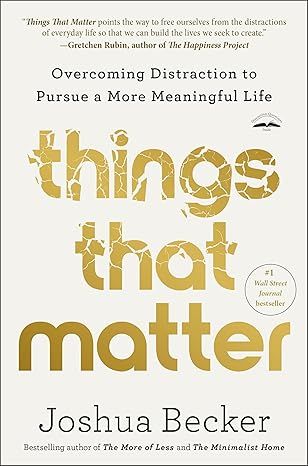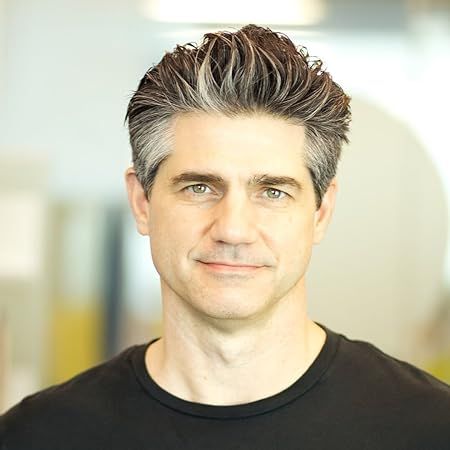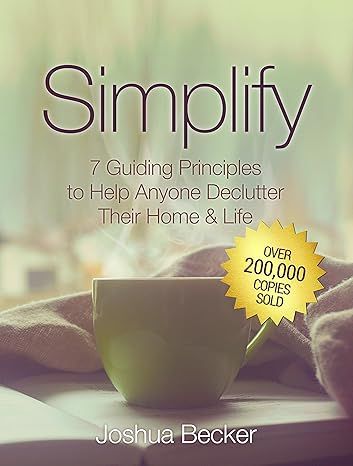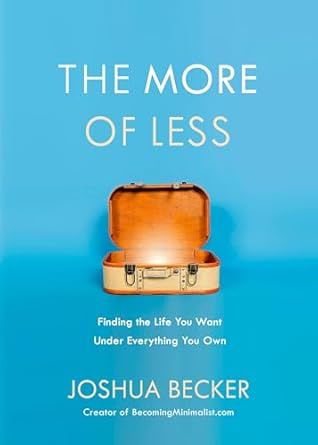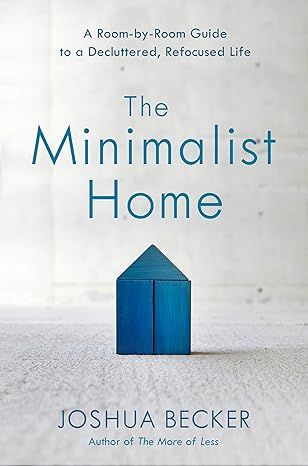Things That Matter: Overcoming Distraction to Pursue a More Meaningful Life
4.7
-
1,335 ratings
#1 WALL STREET JOURNAL BESTSELLER • Discover practical steps you can take today to live a life focused on things that matter, from the bestselling author of The More of Less and The Minimalist Home.
“Things That Matter points the way to free ourselves from the distractions of everyday life so that we can build the lives we seek to create.”—Gretchen Rubin, author of The Happiness Project
Everywhere around you are distractions: That text you respond to quickly, just to get it out of the way. The newest money-making side hustle to cross your mind. The evening spent organizing your overflowing kitchen cupboards.
Disruptions are the enemies of a life well lived—both the new distractions of our generation and timeless ones that have existed for centuries. They all add up to make you feel restless, tired, and unfulfilled. They’re keeping you from living with joy, from accomplishing the good that only you can do.
But that can change today.
In Things That Matter, Joshua Becker uses practical exercises, questions, insights from a nationwide survey, and success stories to give you the motivation you need to
- identify the pursuits that matter most to you
- align your dreams with your daily priorities
- recognize how money and possessions keep you from happiness
- become aware of how others’ opinions of you influence your choices
- embrace what you’re truly passionate about instead of planning that next escape
- figure out what to do with all those emails, notifications, and pings
- let go of past mistakes and debilitating habits Things That Matter is a book about living well. It’s about overcoming the chatter of a world focused on all the wrong things. It’s about rethinking the common assumptions of today to find satisfaction and fulfillment tomorrow. How do we get to the end of our lives with minimal regrets? We set aside lesser pursuits to seek lasting meaning. And we discover the joy of doing it every day.
Read more
Kindle
$12.99
Available instantly
Audiobook
$0.00
with membership trial
Hardcover
$12.49
Paperback
$13.99
Ships from
Amazon.com
Payment
Secure transaction
ISBN-10
0593193997
ISBN-13
978-0593193990
Print length
272 pages
Language
English
Publisher
WaterBrook
Publication date
December 11, 2023
Dimensions
5.45 x 0.72 x 8.19 inches
Item weight
8.8 ounces
Popular highlights in this book
There are people in your life whom you can serve and love better than anyone else can.
Highlighted by 1,228 Kindle readers
The enemy of intentionality and a life well lived is distraction. Know your enemy.
Highlighted by 1,088 Kindle readers
We choose well. We set aside lesser pursuits to seek meaning in our lives. And we do it every single day.
Highlighted by 422 Kindle readers
Product details
ASIN :
B099VXP3BH
File size :
6067 KB
Text-to-speech :
Enabled
Screen reader :
Supported
Enhanced typesetting :
Enabled
X-Ray :
Enabled
Word wise :
Enabled
Editorial reviews
“The thought-provoking insights and stories inside Things That Matter will help you live your one precious life with more presence, purpose, and peace.”—Rachel Macy Stafford, New York Times bestselling author of Hands Free Mama
“Things That Matter is a must-read to recenter yourself and filter out the distractions of the world.” —Chris Norton, motivational keynote speaker featured in 7 Yards
“Reminding us that chasing fame and fortune squanders our precious life energy, Joshua offers a compassionate guide to finding what really matters.” —Robert J. Waldinger, MD, professor of psychiatry at Harvard Medical School
“Joshua shares his insight from the perspective of a caring friend who wants to help you move beyond the regret-and-avoidance cycle into purposeful living.”—Dawn Madsen, The Minimal Mom and author of Declutter Your Home in 15 Minutes a Day
“This delightful guide full of impactful and practical information will lead you through many of the roadblocks you may be facing.”—Ronald L. Banks, speaker, writer, and coach
“Things That Matter is required reading for anyone seeking practical guidance on how to confront life’s many distractions and—more importantly—how to overcome them.”—Christine Platt, author of The Afrominimalist’s Guide to Living with Less
“By removing the distractions outlined in this book, we are able to clear the clutter and create space to build life balance, personal growth, and purpose.”—Dave Braun and Troy Amdahl (The OolaGuys), experts on work-life balance
“This book’s siren call—that we should aim to be generous, not wealthy, and get dirt under our fingernails by serving others—cements Joshua’s status as a much-needed voice of reason and kindness in the modern world.”—Helen Russell, bestselling author of How to Be Sad
“Every once in a while you read a book that can save you years (or decades) of angst, disappointment, and missed attempts at finding significance and contentment. This is one of those books, packed with wisdom and insight.”—Carey Nieuwhof, bestselling author, speaker, and podcast host
“Joshua’s work and this book are a beautiful combination of wisdom, warmth, and practical advice to help us live with intention and meaning. We have the power to make choices every day to do more of what truly matters—and Joshua offers us practical suggestions to do this.”—Nataly Kogan, bestselling author of The Awesome Human Project
“Ten years from now it won’t really matter what shoes you wore today, how your hair looked, or what brand of clothes you wore. What will matter is how you lived, how you loved, and what you learned along the way. And Things That Matter is a beautiful guide for getting there.”—Marc and Angel Chernoff, New York Times bestselling authors of Getting Back to Happy
Read more
Sample
PART 1
THE OBJECTIVE AND THE OBSTACLES
1
A Life with No Regrets
Beginning with a View to the End
We are not given a short life but we make it short, and we are not ill-supplied but wasteful of it….
Life is long if you know how to use it.
—Seneca, “On the Shortness of Life”
Bronnie Ware, an Australian nurse who spent several years caring for people during the last weeks of their lives, routinely asked her patients about any regrets they had or anything they would do differently if they could. Later she posted an article called “Regrets of the Dying” about her findings. In it, Ware wrote of the phenomenal clarity of vision that people gained at the end of their lives as well as the common themes that surfaced again and again during these conversations. This article has been shared millions of times online and was turned into a book in 2012.[1]
It’s a fascinating premise, isn’t it? What do people most regret about their lives?
I’m not going to include the list here. Instead, I want to ask you: How badly do you want to know what’s on it? How tempted are you to google the article right now so you can see the top regrets that people have at the end of their lives? And more importantly, where does that desire to know the regrets of the dying come from? Isn’t the strength of your interest proof that you’re concerned that your life might be wasted?
(Now that I’ve got you thinking about that, if you still want to know what the list is, you can turn to the first endnote at the back of this book and find the list there.)
Why did a list about other people’s dying regrets go viral? It’s because we all know that’s going to be us nearing death someday and we don’t want to have regrets when we get there. And also, I believe, because we’re already starting to have regrets about our life choices.
For people in middle age, and even for people in young adulthood, it’s common to have nagging anxiety that we’re squandering our time and resources on things that are not important while not focusing enough on the things and people that really do matter. And we can easily imagine that we’ll be sorry about it someday if we don’t make a change. Yet on and on we go, putting the inconsequential ahead of the imperative.
On and on we go, putting the inconsequential ahead of the imperative.
Something’s got to change here. And there’s only so much time ahead in each of our lives to make the change.
We’re always going to make some foolish decisions along the way that we wish we could take back. So it’s probably not possible to live a life with absolutely no regrets. But it most certainly is possible to make changes that take us off the easy path of immersing ourselves in the ordinary and the immediate and put us onto a more intentional path that leads to a life that satisfies and resonates beyond our own mortal existence—a life well lived. Presented with the choice, don’t we all want a life of fewer regrets and more fulfillment?
One day, not long ago, I was forced to come face to face with something I just had to do before I died. And I want to tell you about it now, because it’s related to you.
One Thing
In October 2019, I sat with a number of team members from my staff at a conference called Start Finishing, at the K’é Main Street Learning Lab in Mesa, Arizona. Charlie Gilkey, author of a book with the same title as the conference, was our presenter for the day. Charlie told us he wanted us to be specific in applying the principles of the workshop to the most important work in our lives. To help us determine what that work was, he said, “Close your eyes and answer this question: If you were to die today, what is the one project you would be most disappointed that you weren’t able to complete?”
After asking ourselves the question, we shared around the table what work we saw as most important. The young woman next to me mentioned an art project she wanted to complete. A mother of two spoke about her desire to prepare her two teenagers for life. For me, without hesitation, I answered Charlie’s question this way: “If I were to die today, I would be most disappointed that I never got a chance to write that book I’ve been thinking about for a long time now.”
I bet you can guess what book it was.
It’s the one you’re reading right now.
For a while, I’d been thinking about writing a book that takes the principles of minimalism I am known for and paints a bigger picture of how distractions keep us from meaning, purpose, and satisfaction. And at that very moment in the Learning Lab, writing Things That Matter became my highest-priority task. Because there is one message that drives me more than any other—and it’s not helping people clean out their closets, as useful as that is. The one message that burns most in my heart is the invitation to live an intentional, meaningful life. Apart from my faith and my family, this message is what I most want to be remembered for after I’m gone.
I’ve been reading and writing and talking about this subject for years, which has given me the opportunity to pick up many viewpoints and stories. Now I’m bringing all the most important insights together in one volume, focusing especially on how to achieve the focus that is required to live according to your priorities. In Things That Matter, I want to show you what you need to clear away from your life to transition to more intentional living.
Living a life of purpose is important not just to me or to a few others like me. It’s important to all of us, because we all have at least one thing (probably more) that we feel we just have to do before we die. And I’m not talking about bucket-list items like “ride in a hot-air balloon.” I’m talking about living in a way that makes a difference. I’m talking about knowing our lives matter and make an impact on the world in a positive way, that our existences mean something.
This brings me to you. Let me ask you the same question Charlie Gilkey asked me: If you were to die today, what one thing (or few things) would you be most disappointed that you weren’t able to complete? Please don’t just cruise past that question. Stop and think about it. Identify your top-level goals, clearly and specifically.
If you were to die today, what one thing (or few things) would you be most disappointed that you weren’t able to complete?
In preparation for writing this book, I commissioned a nationally representative poll—the Things That Matter Survey—that asked a number of questions related to the themes of this book.[2] I’ll be referring to the survey findings regularly in the chapters to come, and I believe you’ll find the results fascinating. To start with, one question we asked was “Would you say that you have identified a clear purpose, or purposes, for your life?” I was pleased to see that 70 percent of respondents answered yes. Another 19 percent answered no, while 11 percent were unsure.
Do you know your purpose or purposes? If the answer is no or you are unsure (like 30 percent of the poll participants), I invite you to go to the “Discover Your Purposes” exercise at the end of this book. It will help you methodically think through the desires that land at the intersection of your passions, your abilities, and the needs of the world. You’ll see what works of service you’re suited for and drawn toward doing.
If you’re a part of the 70 percent and you think you know your purpose, that’s wonderful. Nevertheless, I encourage you to keep your mind open, because this book most likely will help you refine or redefine the things that matter to you along the way.
Right now, I want you to start believing that it’s not too late to reorient your life around your purposes. You can do something now to live the life you want to live and eventually come to the end with fewer regrets.
You can do something now to live the life you want to live.
The theme of this book isn’t a “how to be happy” message, though I believe living a life aligned with your values and passions is the quickest way to happiness in both the short term and the long term. This book is about so much more than how you feel; it’s about how you live the one life you have and how to keep it focused on the things that matter. I would go so far as to say the world needs you to live for the things that matter to you because you’re at your most productive and influential self when you’re offering your unique contribution.
There may be no greater pursuit for yourself and others than choosing to live a meaningful life focused on the things that matter.
How to Make Your Life Long Enough
In college, I had a professor who taught, “Make a point to read books from previous centuries, because all living writers are swimming in the same cultural and ideological currents. But a book from centuries ago will come from a different perspective and will challenge your thinking in new ways.”
I’ve tried to live by that advice. In fact, a lot of my ideas about God, minimalism, living with purpose, and other subjects close to my heart have been informed by wise men and women of past ages. They bring a fresh perspective in a way that modern scholars or pundits can’t. And I’ve found that themes echoed repeatedly in different eras and in different places are often themes that can still show us the way to a better life.
With that in mind, I want to share with you a quote that has meant a great deal to me for many years now. It’s from Seneca the Younger, a Roman philosopher born about the same time as Jesus of Nazareth.
It is not that we have a short time to live, but that we waste a lot of it. Life is long enough, and a sufficiently generous amount has been given to us for the highest achievements if it were all well invested. But when it is wasted in heedless luxury and spent on no good activity, we are forced at last by death’s final constraint to realize that it has passed away before we knew it was passing. So it is: we are not given a short life but we make it short, and we are not ill-supplied but wasteful of it….
Life is long if you know how to use it.[3]
There’s a lot in that excerpt. I’d urge you to reread it, and maybe even get out a pen and underline key phrases that stick out to you. Start with “we waste a lot of it.”
Seneca’s bold claim is what I’m talking about when I refer to intentional living. It’s living on purpose. It’s spending our limited time on “the highest achievements” instead of on “heedless luxury” and “no good activity.” Because if we do that, then we’ll find life is long enough to do what matters most.
How we get to the end of our lives with minimal regrets: We choose well. We set aside lesser pursuits to seek meaning in our lives. And we do it every single day.
Seneca points us to the answer to the conundrum of how we get to the end of our lives with minimal regrets: We choose well. We set aside lesser pursuits to seek meaning in our lives. And we do it every single day.
Becoming Meaningful
For me, learning how to live my life on purpose was not an instantaneous epiphany, although there were plenty of light-bulb moments along the way. It was more of a gradual growth in understanding, influenced by the things going on in my life over many years.
My faith upbringing primed me for thinking about priorities and pursuing the important things in life. It caused me to focus on issues of what matters for eternity and what does not. Then, as a young man, I became a pastor and spent my time helping others find their way in life through biblical teaching. So I’ve got to give my family and my faith tradition a lot of credit for attuning me to the issues we’re talking about in this book. (By the way, Things That Matter is not a religious book, but because my faith has shaped me, I will mention my own religious history from time to time.) Despite the benefits in my background, it wasn’t until after I’d become a minimalist in my early thirties that my mental space was freed up, and even forced, to really face questions of priority.
If you’ve read any of my books or blog posts over the last dozen-plus years, you know how important simple living is to me.[4] In fact, one of my greatest passions in life is to inspire and help people to own less stuff. Minimalism is one thing that matters greatly to me. Nevertheless, to me, minimalism has always been a means, not an end in itself.
I define minimalism as “the intentional promotion of the things we most value by removing anything that distracts us from them.” It isn’t negative; it’s positive. It isn’t primarily about decluttering or organizing; it’s about creating freedom. Because when we own fewer possessions, we liberate precious energy, time, and focus that we can direct toward more meaningful pursuits.
I’ve experienced the benefits of this reality in my own life. Minimalism gave me the ability to really explore the topic of significant living in myself and in what I was seeing in the world. I began thinking, Accumulating more and more possessions is a foolish pursuit, when you think about it, but it’s not the only foolish pursuit in life. So what are some of the other distractions that I see in my life? Or in the lives of people close to me? Is it possible to live life with fewer regrets? And if so, what keeps people from a fulfilled life in ways they aren’t even noticing?
Gradually, I began experimenting with my newfound freedom to see what I could do that helped other people and brought me joy. And in all honesty, since my family discarded the majority of our possessions in 2008, I’ve accomplished way more with my life than I ever thought I would. It’s not because I’m special. It’s because I’m intentional.
May I share a few highlights?
It all started with a blog, Becoming Minimalist, that chronicled my journey and thoughts since the first week I started minimizing. That blog has now reached sixty million people with the life-changing message of owning less. I started a Facebook page, also called Becoming Minimalist, that now reaches over fifty million people every month. My YouTube channel accounts for millions of minutes watched every month. I’ve written four books, started two digital magazines, developed a mobile app, and created an online course called Uncluttered that has helped over seventy thousand families declutter their homes. I’ve traveled the world speaking, have been featured in several documentaries, and have been interviewed or published in major media outlets around the world.
It’s been quite a ride. But I don’t share those facts with a prideful attitude (although I am proud of them). I share those accomplishments to make a point: I believe, beyond the semblance of a doubt, that my accomplishments over the last few years are directly related to my pursuit of a life focused on the things that I believe truly matter.
Read more
About the authors
Joshua Becker
Joshua Becker and his young family were introduced to minimalism 12 years ago during a short conversation with their neighbor and he immediately became a pioneer of the Modern Minimalist Movement with his blog, Becoming Minimalist. Through his blog, Joshua’s story and writing have inspired millions around the world to find more life by owning fewer possessions. Today, based on his thoughtful and intentional approach to minimalism, he is one of the leading voices in the modern simplicity movement reaching over 2 million readers every month.
Joshua is the founder and editor of Becoming Minimalist, a website dedicated to intentional living that was named by SUCCESS Magazine as one of the top ten personal development websites.
He is also the USA Today and WSJ best-selling author of 5 books: The Minimalist Home, The More of Less, Simplify, and Clutterfree with Kids. His new book, Things That Matter, will be released in April 2022.
He is a contributor to Forbes Magazine and has appeared in the New York Times, USA Today, Boston Globe, Washington Post, Reader's Digest, the Drew Barrymore Show and countless other media outlets—speaking live on 6 different continents and for Fortune 100 countries around the US including Google, Airbnb, and SalesForce.
He is also the Founder of The Hope Effect, a nonprofit organization changing how the world cares for orphans. Currently, he lives in Peoria, AZ with his wife and two teenage children.
Read more
Reviews
Customer reviews
4.7 out of 5
1,335 global ratings
melinda
5
Great Read
Reviewed in the United States on June 14, 2024
Verified Purchase
Joshua has done it again. Peels back the mental clutter and daily distractions to help us figure out what really matters in life. A book I'll be reading again... and again. Great job Joshua Becker.. God bless you!
3 people found this helpful
D. Bryan
5
The Cost of Keeping This Outweighs The Cost of Acquiring This!
Reviewed in the United States on May 14, 2022
Verified Purchase
I've been saying 'I have been decluttering for many many years' and it isn't making sense. There is always a lot more to do. I learned (from another author) I had been organizing... not decluttering. That discovery (and a year later) I'm making much more progress. There were still blocks in my mind around it, the emotional stress of doing it, but I just did it anyway in a routine. Then I started following Joshua Becker's blog, and found out about this new book "things that matter" I thought it would tell me exactly what to keep, you know, he would tell me what the things that matter are. lol
I discovered what matters to me though the perspectives presented in this book!!!
Reading this book helped me realize a lot of the emotional stress. I believed I had clarified why I want to declutter, but I had no idea what it would look like after I made progress. I had no idea what to keep. Part of the emotional stress was the 'past cost' of acquiring it. Another part of the distraction and energy stress was I kept saying my 'why' was so my family would not need to sort it all out later (as others have seen how expensive and time consuming that can be if someone downsizes or dies and doesn't have the ability to sort it all out).
The mindset shift is incredible! Now I have a clearer idea about which of my abilities, passions, and responsibilities to others are most important to me. This has helped me view every thing and every daily habit more closely. In the book this is called "Discovering Your Purposes" - For myself this is how I discovered (thanks to this book and the perspectives presented) the purposes of 'things' I thought I needed because I do have many abilities and many passions... but I don't have a container for all the things, that all of these interests normally require. After freeing myself of the mindset, now, I don't 'need' to pursue that larger container. I can stop 'chasing more than one rabbit' and focus.
Now I will focus on three things and the rest, duplicates, or things that do stuff I could actually still do if I didn't have the 'specialty' tool to do it, will find new homes. I will just let go of the idea of the losses from the cost of acquiring things and focus more on the cost of keeping, maintaining, and space management problems.
My new WHY; How can I do MY three most important things today when there isn't room? When other things need attention (maintenance, repair, or simply dusting), it would be better to pass them along to someone who has this or that on their Most Important things list.
I'll continue my daily habit of decluttering but I'll know exactly what matters and what I don't need to accomplish what I am pursuing (only three things now).
Now My Why is to have the space, time, and energy to do what I truly want to do. Rather than simply saving my family from having to do it for me if I am not able to when it needs done.
For the 'past cost emotional stress' I now say "The Cost of Keeping This FAR Outweighs The Cost of Acquiring This! Let it Go!"
Read more
78 people found this helpful
Zippy
5
Well appreciated gift
Reviewed in the United States on July 1, 2024
Verified Purchase
The recipient, in this case my husband loves to learn and loves real physical books. Things That Matter is a must have for a person who’s high achieving and caring. It’s a great addition to the ever-growing personal library to remember what’s truly important in life. You know, what really matter.
Top Joshua Becker titles
View allBest sellers
View all
The Tuscan Child
4.2
-
100,022
$8.39

The Thursday Murder Club: A Novel (A Thursday Murder Club Mystery)
4.3
-
155,575
$6.33

Sapiens: A Brief History of Humankind
4.6
-
140,302
$13.49

The Butterfly Garden (The Collector, 1)
4.3
-
88,556
$9.59

Things We Hide from the Light (Knockemout Series, 2)
4.4
-
94,890
$11.66

The Last Thing He Told Me: A Novel
4.3
-
154,085
$2.99

The Perfect Marriage: A Completely Gripping Psychological Suspense
4.3
-
143,196
$9.47

The Coworker
4.1
-
80,003
$13.48

First Lie Wins: A Novel (Random House Large Print)
4.3
-
54,062
$14.99

Mile High (Windy City Series Book 1)
4.4
-
59,745
$16.19

Layla
4.2
-
107,613
$8.99

The Locked Door
4.4
-
94,673
$8.53
